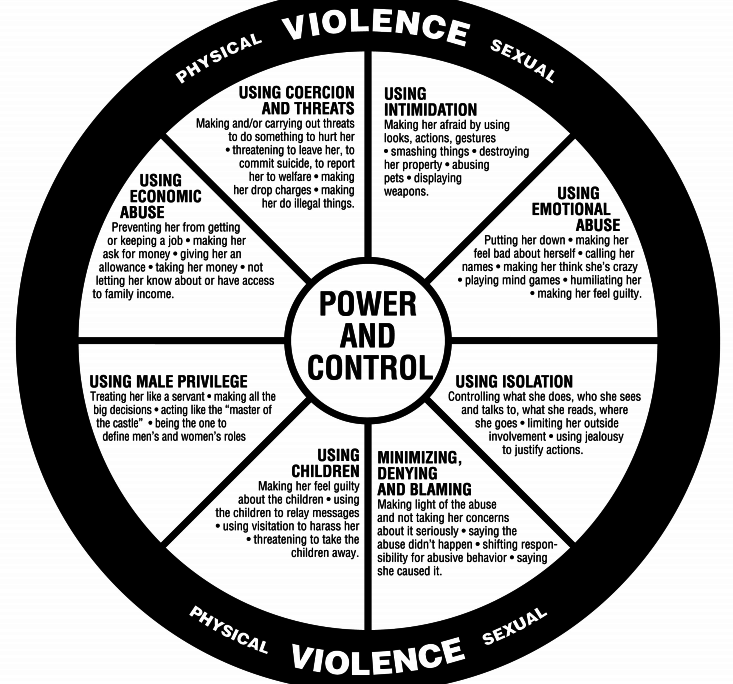Common Signs of Abuse and What to Do About It
Domestic abuse used to be a somewhat hidden topic. It may have seemed too shameful to speak about, especially because of the strong possibility that disclosure would be met with skepticism. Although it’s become more acceptable to talk about abuse today, victims are still often met with disbelief or blame. For this reason, among others, they are often afraid to talk about their experience.
In this article, we’ll discuss the most statistically prevalent form of abuse, which is committed by a male perpetrator on a female victim. (It is possible for any gender to commit abuse, which means men can be victims as well.)
Here are some of the most frequent questions I am asked as a domestic abuse counselor:
- If there’s no physical violence, is it really abuse?
- If he’s never touched me but is threatening and controlling, is this abuse?
- Is it possible to fix the relationship?
 I want this article to be a place to define domestic abuse. I’ll also list some of the most common signs for outsiders to be aware of, and for victims to be able to confirm that what they are experiencing is indeed abuse. I’ll also outline what steps a victim can take upon finding themselves in an abusive situation.
I want this article to be a place to define domestic abuse. I’ll also list some of the most common signs for outsiders to be aware of, and for victims to be able to confirm that what they are experiencing is indeed abuse. I’ll also outline what steps a victim can take upon finding themselves in an abusive situation.
The Definition of Domestic Abuse
Abuse is rooted in a sense of entitlement and a desire for control. The attempt to control can involve many different behaviors, including threats, fear-mongering, physical violence, or other attempts to limit the victim’s independence.
Domestic abuse does not discriminate. It can happen to anyone. Its cyclical nature traps victims into believing that it’s eventually going to change, but then it never does. It crosses socio-economic, racial, and religious barriers, and it can happen to victims of any age.
Because of how insidious domestic abuse is, it’s often difficult for victims to fully acknowledge what’s happening to them. Domestic abuse tends to escalate over time, making the victim’s situation increasingly dangerous.
Acknowledging the abuse is the first step. Recognizing what’s happening to you includes the realization that you are worth far more than this and don’t deserve to be treated in such a way (although the abuser will try to blame you).
Meeting with a professional can be the next step, but make sure that you are doing so safely to avoid retaliatory actions from your abuser. When a victim takes even a small step towards independence, abuse can escalate quickly.
Common Signs of Abuse: The Power and Control Wheel
The “Power and Control Wheel” is a resource used by the National Domestic Violence Hotline. It divides abuse into eight categories, which you can see in the following image. Here you’ll see that abuse includes but is not limited to physical actions.

Coercion and threats: This can include self-harm, threats of suicide, or threats to hurt you or someone you love. Possible threats include violent ones, but other forms of harm are included as well.
An abuser may threaten to get you in trouble in some way or take something you value. These threats are made in order to intimidate you so you’ll submit to their demands or allow them to further abuse you. Threats of self-harm may also be used, in order to guilt you into giving in to the abuser’s demands.
 Domestic abuse does not always happen how you might think. It can start small and build up from there. Often, abusers choose kind-hearted, empathetic victims whose very strengths are used against them. The victims are then manipulated into a life of submission to a controlling, abusive partner.
Domestic abuse does not always happen how you might think. It can start small and build up from there. Often, abusers choose kind-hearted, empathetic victims whose very strengths are used against them. The victims are then manipulated into a life of submission to a controlling, abusive partner.
Intimidation: This form of abuse is related to coercion and threats. Intimidation describes the instilling of fear to force the victim into compliance. If the victim does not comply, she knows there will be consequences.
Emotional abuse: This type of abuse can be easy to hide or deny. Since it doesn’t leave physical scars, the abuser often claims the abuse didn’t happen or that the victim is exaggerating, being overly sensitive, etc.
Emotional abuse is a pattern of mind games, put-downs, insults that may or may not be disguised as jokes, minimizing, denying, blame-shifting, gaslighting, using male privilege, and more. The effect of this over time is that the victim’s confidence and self-worth drastically deteriorate. The victim then finds herself constantly seeking the intermittent reinforcement (periods of affection, approval, compliments, etc.) that the abuser periodically doles out.
This type of abuse can seem subtle, but it can eventually overtake the entire relationship and become normalized. When you’re coming to terms with emotional abuse, you need to know that it is not okay for your partner to degrade you, bully you, or verbally abuse you.
Emotionally abusive partners will seek (whether consciously or subconsciously) to condition their victim to accept this unacceptable and cruel behavior, but it is not normal or acceptable, and you do not deserve it.
Isolation is another form of control used by abusive partners. Little by little, the abuser removes your independence. You lose control over your time, spend less time with your friends and family, and become completely absorbed in the relationship. Not only does this isolation enable more abuse to take place, but it also removes both witnesses and influencers who could help break the cycle.
Over time, the abuse escalates as the victim becomes more isolated, and then she has no one to talk to. This benefits the abuser because the more isolated the victim is, the less likely someone will convince her that he’s abusive and she needs to leave.
Many domestic abusers will minimize and deny that the abuse is even happening. The abuser can also blame their significant other for the abuse. This can be very confusing for the victim. I have heard clients say things like, “Am I going crazy? Is this really not happening?” This is all part of the abuser’s control tactics, by making you feel “crazy” and/or confused, and he can keep the abuse going.
Minimizing and denying: This is an integral part of abuse. Very few abusers are violent, angry, or mean 24/7. They intersperse their abuse with occasional good treatment (although this can become more and more rare as the abuse escalates).
 This keeps the victim confused and off-balance. She might think that the latest abusive incident is the last one. She might think it’s her fault, which he would like to convince her of, especially if she responds emotionally or angrily to his treatment of her.
This keeps the victim confused and off-balance. She might think that the latest abusive incident is the last one. She might think it’s her fault, which he would like to convince her of, especially if she responds emotionally or angrily to his treatment of her.
Often the abuser will convince the victim that his treatment of her is not that big of a deal, that she’s just too sensitive, that all relationships are like this, or that it didn’t happen at all. (This is especially powerful if he is not physically violent but sticks to emotional abuse. How can she prove it, even to herself?)
Abusers also gaslight their victims by claiming to forget an abusive incident or twisting it to make it seem like it happened differently than it did.
Using children: Abusive partners often use children as pawns in their quest to control their victim. They take advantage of a mother’s fierce maternal instincts and manipulate that love to intimidate, threaten, manipulate, and/or demean her.
One of the most frequent and potent examples of this is when an abuser threatens to take the kids and prevent the victim from seeing them. He does this so she will agree to his terms. It can be terrifying to encounter this and know what to do next to both escape the abuse and not lose the children.
Male privilege: This type of abuse is when a man uses his gender as a basis for power and control. He bases his demands on the fact that he is the man of the house, or on his twisted view of traditional gender roles. Many healthy marriages are based on traditional gender roles, but it is not healthy when a man uses “gender roles” to control his partner.
He does this to create an imbalance of power so he can make unilateral decisions without taking her thoughts or wishes into account. This leads to a feeling of helplessness on the part of the victim. She might feel as if she has no say in anything about her life or decisions for the family.
Economic abuse: This is another form of subtle abuse that is very difficult to identify and address. It involves the woman being financially dependent and the man using this to control her and benefit himself. This can take many forms, and it can happen whether or not she is working herself.
What Should I Do Now?
If you have read this and started to realize that you are in an abusive relationship, or maybe that someone you know is, it’s important to know what to do next.
 Assessing the safety and risks is the important factor. Once a woman begins to make efforts to change the relationship or to leave the situation, the risk of violence increases exponentially. Making a safety plan is paramount if you believe there is even the slightest risk of violence.
Assessing the safety and risks is the important factor. Once a woman begins to make efforts to change the relationship or to leave the situation, the risk of violence increases exponentially. Making a safety plan is paramount if you believe there is even the slightest risk of violence.
Listen to your intuition; it’s a powerful ally. Physical abuse can begin suddenly even if only non-physical abuse was happening before. The National Domestic Hotline (1-800-799-7233) can be a good place to start assessing your safety and deciding what to do next.
Seek Counseling
A counselor can be an invaluable resource if you feel that you are experiencing domestic abuse. The isolation of abuse can make freedom seem almost impossible to attain. Doing it alone is overwhelming, and it’s easy for the abuser to maintain control.
The support and professional guidance you’ll receive from a Christian counselor can help alleviate the anxiety of this process. We will walk with you as you begin your journey to safety, freedom, and healing.
Escaping a domestic abuse situation is not simple. A counselor can help you to carry out the next indicated actions, as well as providing practical help making a safety plan, finding lawyers, medical professionals, understanding the law, and more.
The emotions and possibly trauma involved in domestic abuse will require a committed and extended recovery process. Feelings of low self-worth are common and normal after abuse. Counseling can help you process what you’ve been through and find a healthy place of recovery, hope, and personal growth.
The Lord provides comfort for His children. We want to help you seek a relationship with Him so that you can lean on Him each day of this difficult journey. He loves you and does not desire for you to be abused and mistreated.
“I sought the Lord, and He answered me and delivered me from all my fears.” (Psalm 34:4) As Christian counselors, we desire to be instruments of His freedom and healing. You do not have to go through this alone.
“Alone,” courtesy of Tiko Giorgadze, unsplash.com, CC0 License; “Hurt”, Courtesy of Dmitry Ratushny, Unsplash.com; CC0 License; “Victim”, Courtesy of Zach Guinta, Unsplash.com, CC0 License; “Reflection”, Courtesy of AKi Kikuti, Flickr.com, CC 2.0 License



